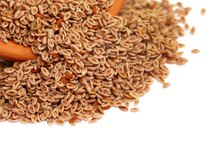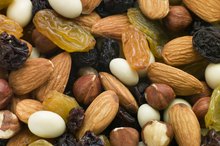Inflammation in the body has been linked to a number of serious medical conditions, including Alzheimer's disease, cancer, stroke, type 2 diabetes and asthma, according to the University of Wisconsin 12. While serious medical conditions require medical treatments, choosing the right foods may help reduce inflammation in your body. Not only do anti-inflammatory foods help reduce inflammation, they are tasty and healthy for you in other ways. If you suffer from inflammation, talk with your doctor about dietary changes that may benefit you.
Omega-3
Omega-3 fatty acids help reduce inflammation. Whole flax seeds are difficult to digest, so choose ground flax seeds or flax seed meal instead. Make sure any flax oil you use is fresh; rancid oils, besides their foul taste, make inflammation worse.
Antioxidants
Supplements for Reducing Ankle Swelling
Learn More
Foods high in antioxidants help reduce inflammation, according to the University of Wisconsin 12.
Soy
Soy may help reduce inflammation. Consider adding tofu, soy beans, soy nuts, tempeh or miso to your diet.
Fiber
How to Stop Weight Loss on Vyvanse
Learn More
Fiber can help reduce inflammation. Foods that are good sources of fiber include whole grains, vegetables and fruits. Avoid fruit or vegetable juices, which have had the fiber removed. Avoid processed or enriched grain products, and choose whole grains instead.
- Fiber can help reduce inflammation.
- Avoid processed or enriched grain products, and choose whole grains instead.
Spices
A number of spices have anti-inflammatory effects 1. According to the University of Michigan, ginger may reduce arthritis and bursitis symptoms; consider adding tea made with fresh ginger to your daily routine.
Vitamin C
Foods rich in Vitamin C help inhibit an enzyme in the body that is responsible for inflammation, according to the University of Minnesota 2. Good sources of Vitamin C in the diet include:
- strawberries
- kiwi
- tomatoes
- citrus fruits
- peppers
- mango
Related Articles
References
Writer Bio
Stephanie Crumley Hill is a childbirth educator who for more than 20 years has written professionally about pregnancy, family and a variety of health and medical topics. A former print magazine editor, her insurance articles for “Resource” magazine garnered numerous awards. She holds a Bachelor of Arts in English from the University of Georgia.








